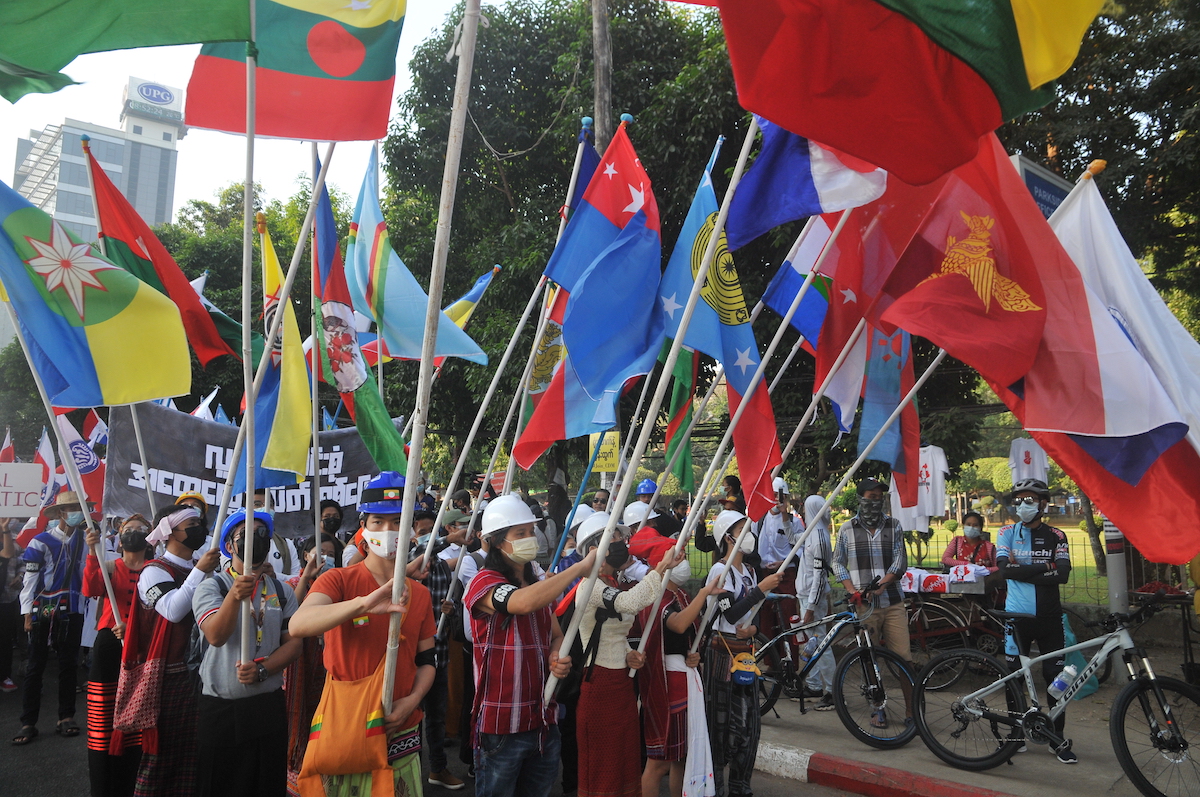|
|
|
The 1 February coup by the military State Administration Council has caused protest and confusion in Myanmar and around the world. In this commentary, Kyaw Lynn puts in context the complexity of factors, personal as much as institutional, that preceded the military takeover during a difficult time for democratic progress on the international stage. He then looks at the critical situation in Rakhine State, examining why political trends have been different to other ethnic states and regions in the country.
See the complete list of all the Myanmar commentaries.
|
|
|
|
 Demonstration by the General Strike Committee Nationalities, Yangon, 24 February Demonstration by the General Strike Committee Nationalities, Yangon, 24 February
|
|
|
|
|
|
|
| |
Reflections on military coups in Myanmar: and why political actors in Arakan chose a different path
A Myanmar Commentary by Kyaw Lynn
1 March 2021
|
I had planned to travel to the Sagaing Region on 1 February. But, at about 3 a.m. that night, one of my closest friends phoned me and said: “The military has staged a coup and detained the State Counsellor and the President”. I was shocked and the trip was immediately cancelled. The military coup took place three weeks ago, and the protests in urban areas are still continuing. Across the country, people are struggling to understand what has happened and why.
Some analysts have searched for the reasons for the military coup based on personal and institutional perspectives. For personal reasons, some said the current Commander-in-Chief has to take retirement this year, and he is afraid of taking a pension without power because he has committed a massive crime against the Rohingya community. Others said that, in terms of institutions, the military might think that they cannot compete in elections with the charismatic Daw Aung San Suu Kyi and the National League for Democracy (NLD) under the “First Past The Post” electoral system. They therefore think that military leaders want to redraw the rules of the game to something like a “Proportional Representation” system in order to reduce the electoral strength of the NLD.
Apart from these institutional perspectives, there are analysts who look at more general trends and political phenomena that might have had impact on military thinking preceding the coup. One issue is that of democratic transition. As such scholars as Larry Diamond have pointed out, the number of democracies around the world has fallen since 2005. Equally pertinent, the first steps towards democratization in Myanmar took place in 2010 under the conditions of what the political scientist Samuel Huntington calls “transformative transition” in which the regime elites decide and initiate the form of political transition. Certainly, democratic transition in Myanmar is still at a fragile stage.
Reflecting these instabilities, the military coup in Myanmar is mirrored by some critical changes that have been taking place in the international environment during the past few years. According to the political scientist Francis Fukuyama, the international landscape has experienced two distinctive changes during the second decade of the 21st century: the upsurge of populism and illiberalism in many liberal countries; and the resurgence of authoritarian powers in different parts of the world. The first trend was highlighted by nationalist resurgence and the electoral victories of populist leaders in such countries as the USA, the UK, India and Brazil, while the second phenomenon is demonstrated by the increase in power projection by China and Russia on the international stage.
|
|
|
|
|
|
| |
|
|
|